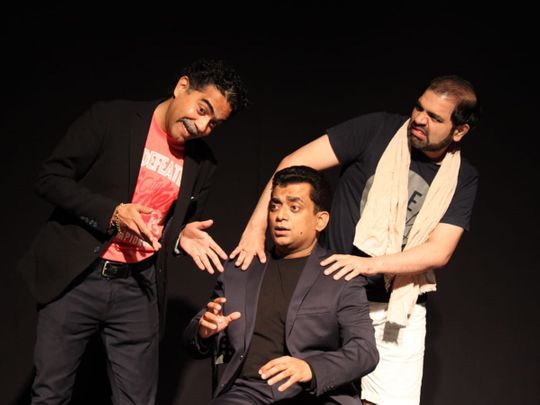
The scars of resentment run deep and run jagged. They come with each expectation that remains unmet, adding to the ocean of doubt, drowning you slowly. If you are close to someone, need unanswered is but a lash at the soul.
In 'Kaumudi', the first full-length play by threate group Udaan Dubai, one follows Satyasheel and Paritosh – an estranged father and son – as they try to work together on a production based off the Indian epic ‘Mahabharata’.
'Kaumudi', which translates into ‘illumination’ or ‘enlightenment’, is running at the Junction on October 17.
Satyasheel, a famed artist who is known for his work as Eklavya from ‘Mahabharata’, is getting on in years and losing his eyesight, costing him his livelihood. Paritosh has over the years become well-known for playing Abhimanyu in ‘Mahabharata’. And now fate and chance have brought both together, for a production that may lead to resolution or greater resentment.
Difficult role
Nilesh Deshpande, who plays Satyasheel, says in an interview with Gulf News that the first time he read the script, he couldn’t get into his character’s skin. ”Initially, after the first read I could not connect with the plot/character instantly due to its multiple layers however after 3-4 reading sessions on Zoom I was completely in awe of the writing and fell in love with the plot and my character. I was mainly intrigued by the sheer scope of this character, which kept unfolding with every read,” he explains.
For Benjamin Samuel, who plays Paritosh, however, the role resonated at once. “I identify with Paritosh's vulnerability. He has gone through a lot of pain and despair in his childhood but he fought it through. He is a self-made man who rose high in his profession with sheer determination,” he explains.
A play within a play
The play interweaves the actors’ lives on and off stage. And in doing so, it gives the director plenty of room to manoeuvre. Director Karan Sharma explains: “The play draws two parallels between the ‘reality on stage’ and the ‘reality off stage’ which gets more pronounced as the play moves along , drawing parallels between the actors' lives off stage and the lives of the characters they portray on stage. Both these parallels gave us a great deal of room to experiment with unusual theatrical devices at almost every stage with the help of props, set design, costumes, masks, make up, choreography.”
As the production reaches a crescendo, it poses four questions: Does age determine a right to life? Is personal ethic above public ethic? Do we make art or does art make us? The value of art is for the onlooker or the creator?
The roots
Playwright Abhishek Majumdar, who is currently the Associate Professor of Performing Arts at New York University in Abu Dhabi, explains that the play was inspired mainly by two texts. “The play was inspired by a Malayalam text by Anand called 'Vyasanam Vigneswaram’ and a text by Borges called ‘Blindness’. I was drawn to the philosophical dilemmas of choice, art and public ethic.”
The playwright, director and scenographer, whose works have been dramatised in several countries including Europe, Asia, Latin America and North America, also says that while the play was written over two years, it was on the backburner for about 10.
No wonder like a baklava – a flaky Arabic, multi-layered treat – the story is an amalgamation of thought, of emotion.
And if that were not enough of a challenge for the cast and crew, additional elements of music and dance added to the complexity of putting together the show. “The idea of creating an amalgamation of dance, music and drama on stage has been the biggest challenge for me as a director considering the sheer size (headcount) of the cast (actors/dancers) under the light of the most unprecedented scenario we as artists have ever faced together,” says Sharma, referring to the restrictions posed by the COVID-19 pandemic.
The COVID roadblock
“Logistically, it posed a list of the worst nightmares one can ever fathom, with several neverending issues ranging from sourcing/convincing the most suitable cast/talent to join us on board to non-availability of indoor rehearsal space to no permission for large public gatherings/rehearsals to unprecedented stage restrictions to budget cuts, to overcoming daily fear of the infection,” he says.
But, “As they say, ‘Where there is a will there is always a way’,” he adds.
The show may weave through moral conundrums, difficult relationship dynamics and the scars that come from expectations unmet, but the production is nothing if not a labour of love.
Don't Miss It!
Tickets to 'Kaumudi', which runs at The Junction on October 17 at 2.30pm and 7.30pm, are Dh85 per person.








